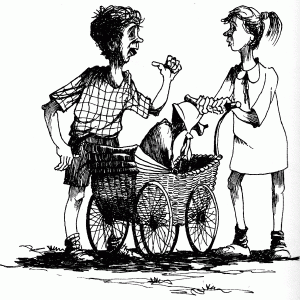The Benefits of Riddles for Kids
By Justin James Zablocki – 2013
In a world where social media and networks are becoming increasingly important to subsequent generations, it is more important than ever to teach children in any way possible and to create bonds with them outside of the internet. One great way to achieve all of this that is being greatly neglected by almost everybody is riddles. Riddles are good for children in more ways than you may think.
Make them laugh: Nothing is more precious than a child’s laughter. Laughter is also a great way to motivate people to keep working when things seem monotonous. It helps us release stress, relaxes the brain and body, and just makes us feel good. Since this boredom is one of the larger problems associated with children’s learning, riddles are a good way to break up the day and relax the brain, while keeping it working.
Make them think: Critical thinking and problem solving skills are two of the most treasured abilities in our society today, demonstrated by the importance of the SAT and ACT in American society. Both of these tests are heavily based on critical thinking and problem solving skills. Riddles have been shown in several studies to improve children’s comprehension and creativity, making them a perfect workout for your brain.
Improve their reading comprehension: In the United States literacy rates are at 99 percent, but comprehension is another story. Everybody can read but this doesn’t mean they can understand more complex subject matter. Riddles improve reading comprehension skills by expanding vocabulary and understanding of words.
Expand their vocabulary: When children (and really everyone) encounter words that they don’t understand they figure them out through context. Riddles give words a great deal of context which makes it easier for children to learn, remember and use these words. In another way, riddles force kids to ask more questions about words they don’t understand.
Allowing them to teach: Teaching kids riddles allows them to know something that is easily repeated and taught to other people. Rather than just repeating information they learn onto tests they can also teach these riddles to their peers, parents, and teachers. This reinforces their understanding of the riddle and it also allows them to interact with people in a constructive social way.
To bond with children: Teaching riddles to children gives them a fun and constructive way to bond with their parents and other individuals, forming good social skills.
For these reasons all kids should be exposed to riddles on a frequent basis.
For some more about kids and riddles take a look at Reading is Funny!: Motivating Kids to Read with Riddles here
For some good riddles for kids visit Good Riddles Now.
Article Source: https://EzineArticles.com/expert/Justin_James_Zablocki/1635976
